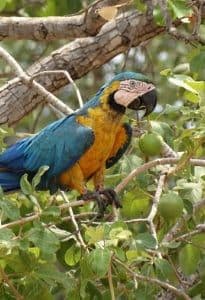The ARR Horizonte Carbon Project is located at the Cerrado Biome, in the state of Mato Grosso do Sul, Brazil. It is an AFOLU project, and therefore is classified within scope 14. More specifically, the project falls under the ARR category.
The ARR Horizonte Carbon Project’s purpose is to remove and reduce GHG emissions through an increase in forestry area in the state of Mato Grosso do Sul, at the Cerrado biome, initially near the cities of Três Lagoas, Brasilândia, Santa Rita do Pardo, Selviria, Bataguassu, Água Clara and Aparecida do Taboado. The carbon credits are a result of the change of land use in previous pasture areas, through the plantation of Eucalyptus species in an area of 14,427.66 ha, as well as a result of the recovery of pasture and degraded areas with exposed soil, through the plantation of native vegetation most adequate for each case in an area of 999.10ha, both classified under the ARR category.
This activity is of great importance for the region under the light of deforestation events and rates for cattle ranching activities, which constitutes the baseline of the project. The state of Mato Grosso do Sul has the highest deforestation rates under the Cerrado biome, which has been the second most impacted biome by deforestation in the country, with 33,5% of the deforested areas.
In addition, the credit’s revenue will allow for an additional restoration of native vegetation on Legal Reserves (RL – Reservas legais, in Portuguese) and Permanent Protection Areas (APP – área de preservação permanente, in Portuguese). Under the social sphere, the project also brings benefits for the region, with the implementation of additional social activities (programs named Inclusive Recycling and the Nursery for Native and Ornamental Seedlings), beyond those already implemented by Suzano where it operates, which will be implemented due to the credit’s revenue. In addition to the socioeconomic benefits, both projects linked to the social scope will bring environmental awareness to the target population about climate change and mitigation actions.
The project started on 02-11-2017 with soil preparation activities. This is the start date of the project, which will have a renewable crediting period of 35 years, from 02-11-2017 to 01-11-2052.




High-integrity carbon credits are those that are robustly and conservatively quantified. We provide intuitive data visualizations that quantify and assess the carbon stocks of projects throughout their lifetime. These data sources are frequently consolidated between technical documentation from project developers, verification reports from auditors as well as transparent and objective remote sensing data.
Carbon projects are additional if they would not have occurred in the absence of carbon credit generation. On the flip side, projects are not additional if the carbon avoidance or removal would have occurred in the status-quo "business as usual" scenario. We provide data to assess the additionality resilience of projects by harnessing geospatial analyses and remote sensing capabilities, among other data sources.
Permanence refers to how long the carbon dioxide removed or avoided will be kept out of the atmosphere. Permanence risk is when storage reversal occurs before the planned duration of storage is up. We monitor the project area for unforeseen disruptions and identify permanence risks by modelling the threat of, for example, adverse weather conditions. Additional information on risk mitigation levers may be included.
The analysis shows the environmental changes in the baseline scenario over the given period and illustrates the projects'needs and efforts. [Data Source: Planet Labs 2016, 2023]
The project ARR Horizonte Carbon project addresses a subset of the UN Sustainable Development Goals (SDGs). A percentage of the profits will be directed to the development of social activities, which will be monitored from implementation of the Programs and activities throughout the life cycle of the Project through the monitoring reports according to the VCS Standard, status of Programs, indicators and activities developed, and other evidences that may be necessary.

















The U.N. Sustainable Development Goals (SDGs) colored in are claimed by the project developer.
Ask our purpose-built AI bot anything related to the contents of the project files listed below
Project developer has not uploaded on-the-ground updates yet.
Hold tight!